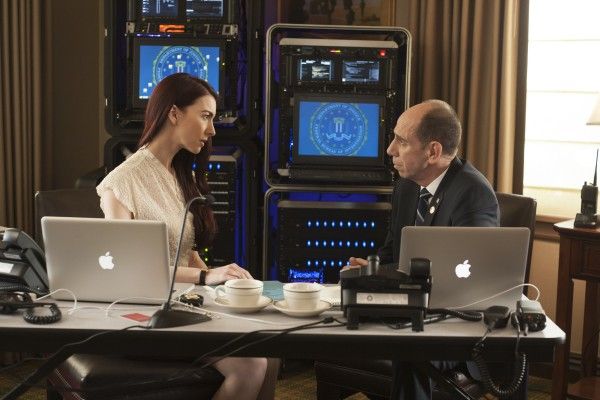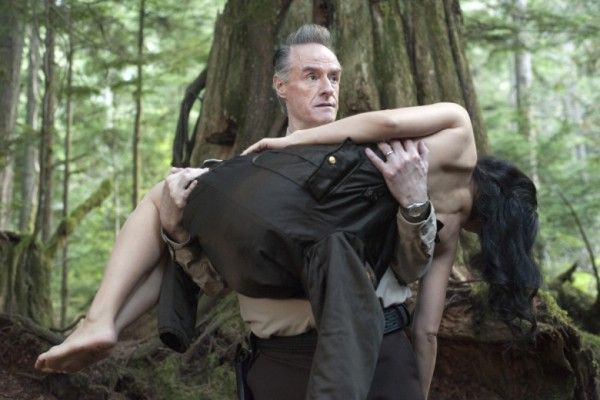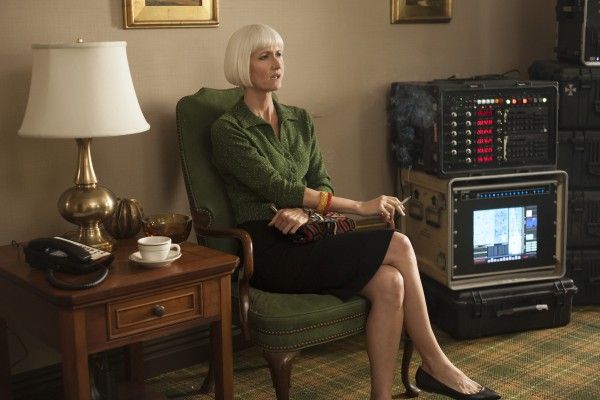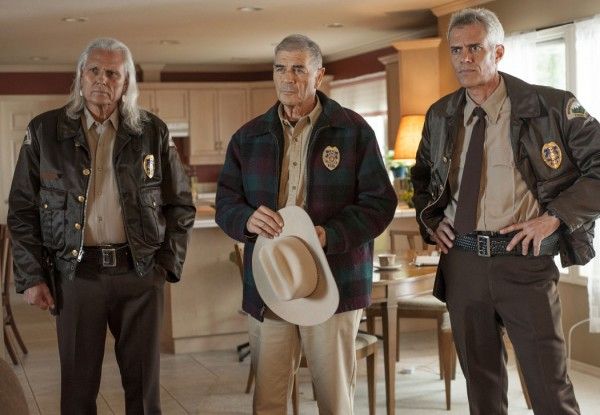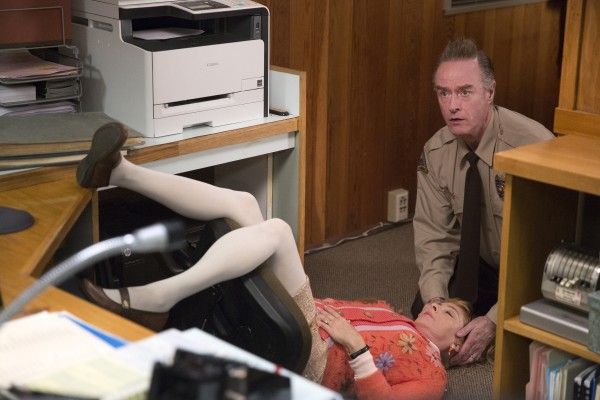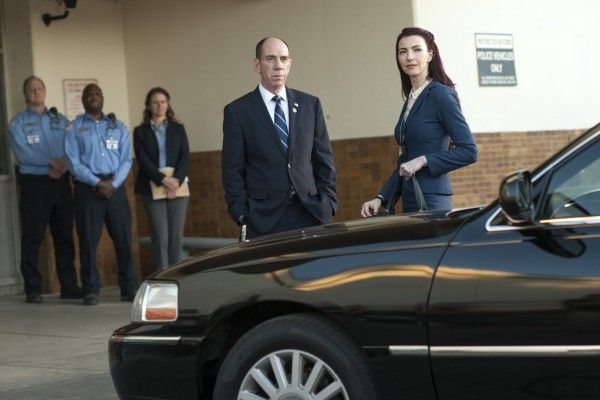The way the opening phone call in "Part 14" of Twin Peaks: The Return unfolded should give you a general sense of where his mindset is as the series prepares to enter its final quartet of episodes. In returning a phone call to Sheriff Truman, Agent Cole has a brief conversation with Lucy for the first time since the events surrounding Laura Palmer's murder. He mentions its been awhile since the last talked and Lucy begins to list the vacations she's taken with Andy, including a trip to Bora Bora. Then, an awkward pause, followed by Lucy realizing that Cole's real business is talking with Truman. Even if the roots of Twin Peaks' resurrection were in nostalgia, Lynch has set his sights forward and has often corrupted or deflated the reemergence of characters and storylines. This is even true of the exchange that immediately follows where Truman must explain to Cole that he is not his brother, the original Sheriff Truman (Michael Ontkean).
The fragile nature of gathering and recollecting information was something that came up often in this episode. Surrounded by computers and massive storage spaces for information, in a knowing moment of deadpan, Albert lays out the history of the terminology of "Blue Rose," tracking it back to a case that Cole and Philip Jeffries (David Bowie) worked on involving a woman named Lois Duffy. Not long after, it's revealed that Diane is Dougie's estranged sister-in-law. That moment would have been explosively staged and surrounded on all sides by a tailored score or a particular song to signal the emotional importance in any other program. Lynch sees it primarily and maybe even exclusively as the revelation of data, rather than a moment that speaks to the show's spiritual and philosophical undercurrent. Instead of milking the moment, Lynch seemingly taunted those who would get excited by this information by reflecting their response in his underling's eruptive, overblown response to Cole sending him into action. "This is what we do!"
There was also a sort of sardonic yet intimate pitch to Cole's dream of Monica Bellucci and returning to one of the early bewildering scenes from Fire Walk With Me. What's most remarkable is that Lynch's meeting with Bellucci seems at once like wild fantasy for Cole but also as an everyday activity for Lynch when he's in Paris. "We're like the dreamer who dreams and lives inside the dream...but who is the dreamer?," asks Bellucci. To take it literally would mean to wonder who Cole, the dreamer, is and, by extension, who Lynch is, a question that many of his biggest fans seem obsessed with piecing together through his images. Not surprisingly, Lynch has shied away from attempted decodings of his work and what it says about him, and here, he pivots by turning attention back to a central question of this convoluted, hallucinatory plot, namely what Jeffries and Cooper were on about in that Fire Walk With Me scene. "That's something to think about," Cole says and that seems to be both a genuine hint at what's next and a thinly veiled ploy.
From there, we returned to Twin Peaks, where Truman decided to clean house by axing a dirty cop (John Pirruccello) and get his ass in gear for the trip to Jackrabbit's Palace. The palace, such as it is, is a big jagged hunk of wood, the dilapidated remnants of a once mighty and tall tree from the looks of it. But just as Bobby once had magic voyages with his father in this place, Andy, Hawk, Truman, and Bobby are also seemingly transported through a dimensional vortex after discussing the corporeal form of the lady who helped send Cooper out of the Black Lodge (Nae Yuuki) and promptly dropped into the abyss of stars. It's Andy who holds her hand and attempts to comfort her and its his journey to meet The Fireman (Carol Struyckenin) that we follow, underlining Lynch's stress on the importance of kindness and respect and his subsequent loathing of the rude and aggressive.
The Fireman's rush of images for Andy made me think back to the discussion between Albert and Tammy. For all that Albert and Tammy talked of Cole's history with "Blue Rose," their talk added nothing to our understanding of these characters or this world, just filled in a blank that undoubtedly hundreds of fans had wondered about beforehand. The images, on the other hand, seemed to be laying out something crucial about Laura Palmer's death, the two Coopers, and what it means for Andy's hometown, even if it wasn't exactly clear or entirely decipherable in the moment. The information only spurs the continued cataloguing of events leading (presumably) to answers about Palmer, the Coopers, and the Black Lodge, whereas the images feed a feverish curiosity and a ravishing game of symbols and analysis.
The subsequent prison scene circles us back around to the zombie thing. Back in "Part 11," Bobby investigated a car crash involving a discharged gun, one that brings him face to face with a young woman in a sort of feral, decomposing state. That's the same feeling that comes from the young man drooling a pool of blood, bile, and saliva, while annoyingly just repeating what people say, including Yuuki's character's shivers of wordless speak. Later, when a talk between two girlfriends leads to the revelation that a blood-covered boy named Billy busted into her house recently, my attention drifted back to this magnificently uneasy sequence.
Before that, however, Lynch returned to his dichotomies of images vs. word in two spectacular sequences. The first involved Jimmy's listening to the backstory of his superhero co-worker, who was blessed with the powers of super-strength by putting on a glove. For those who follow along, there's a charming bit about the origins of the word "Jobsworth" -- a mirror moment from Albert explaining "Blue Rose -- but the story drags on and there's nothing of personal importance revealed about him. Had the scene just had him smashing walnuts and saying that he was in Twin Peaks for a special purpose, there would be little difference in how all this plays out. One could read it as the throwing of shade towards superhero movies and shows that belabor themselves with convoluted, weightless backstory.
The second and far more satisfying interaction involved Sarah Palmer and one tremendously unlucky misogynistic baby-man in a "Truck You" t-shirt. The primo asshole attempts to intimidate Sarah, first physically and then through taunts of this being a free country or, as he means it, "cunt-ry." She's not bothered by his juvenilia, rather his increased crowding of her and his imposing stance, and he, similarly, doesn't seem to be listening to her when she speaks, leading her to seemingly rip his throat out with his teeth. Just as Laura opened her face to reveal beaming, glorious light, Sarah opens her face to reveal drab, joyless images of anger, grief, horror, and overwhelming depression, a feeling of inner death. Whatever Mr. Truck You had seen in his not-so-long life simply did not match up to the screaming terror that Sarah Palmer has witnessed and internalized over these many years.
For all the heady and unresolvable tricks of images and sayings, what "Part 14" continued to highlight was Lynch's sense of humanism. His characters are sensitive to one another, even as they seem lost and unable to reconnect to what used to make them want to live. Andy shows bravery and care when he returns from his visit with The Fireman and brings Yuuki's character to the station. There's a similar tenderness between Truman and Cole when they speak about Harry and Laura Palmer's diary pages. Not all people are good but Lynch never buries the goodness in people when its apparent and pure. If nothing else, that seems much more important to him than exactly where the term "Blue Rose" came from.
Rating: ★★★★


